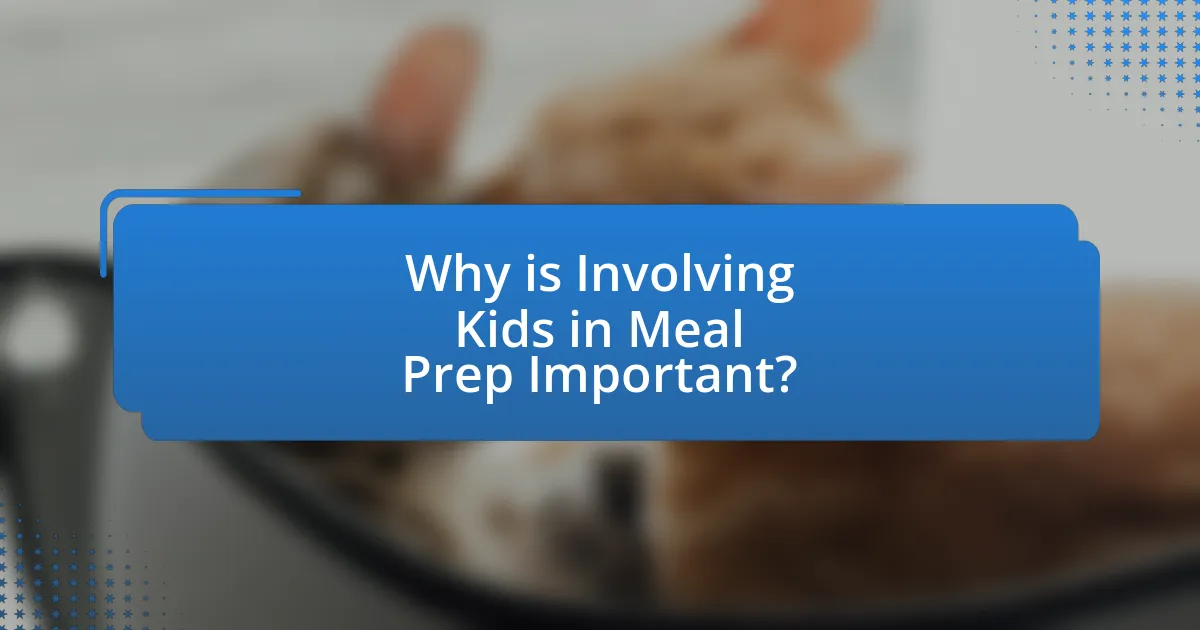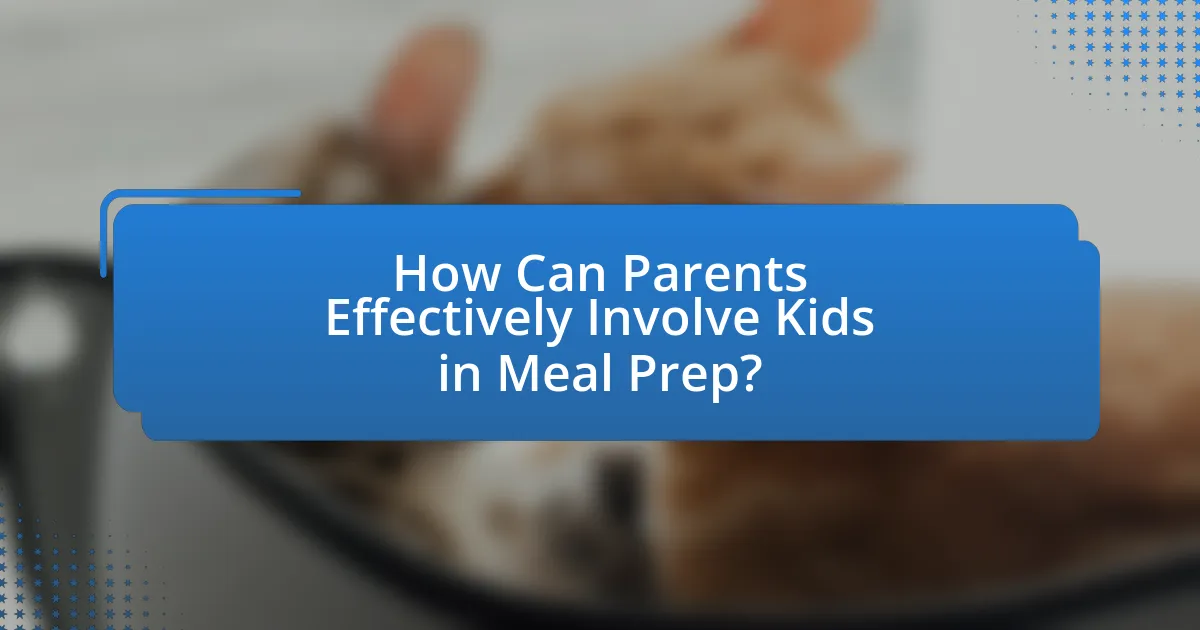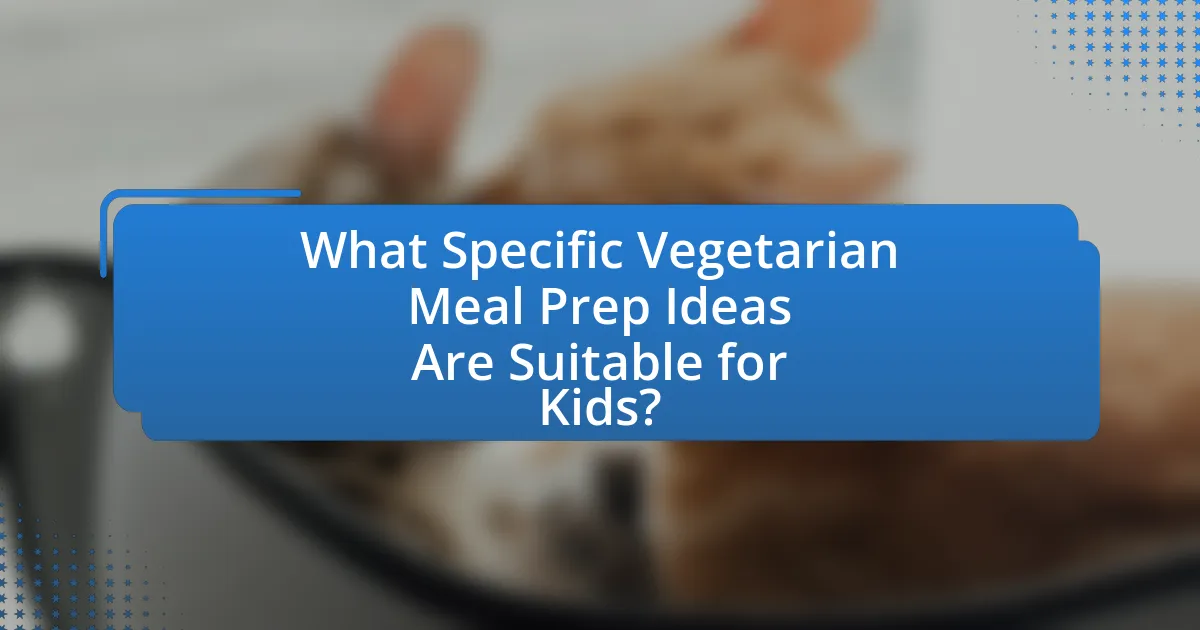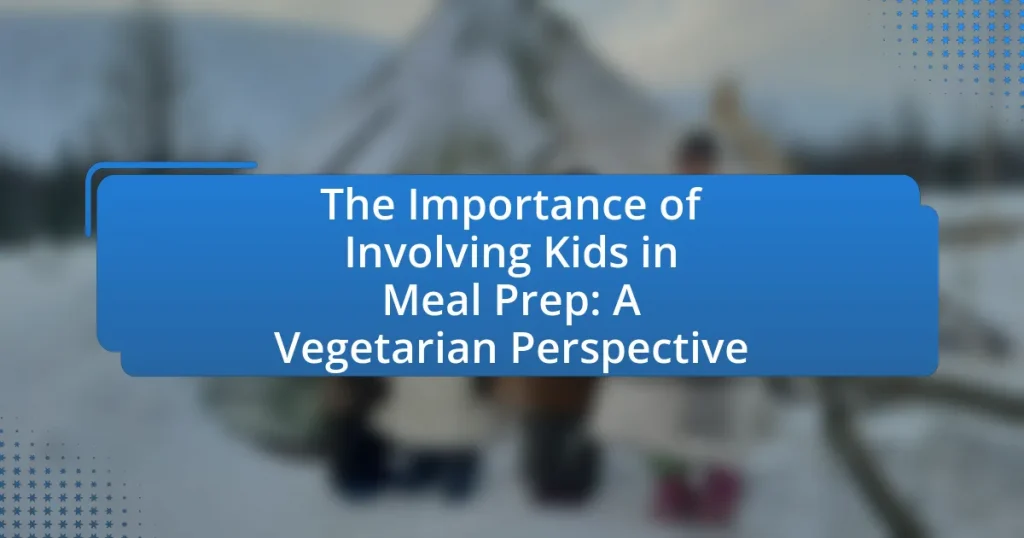The article emphasizes the significance of involving children in meal preparation from a vegetarian perspective, highlighting its role in fostering healthy eating habits and enhancing nutritional understanding. It discusses how hands-on cooking experiences can improve children’s willingness to try new foods, develop essential life skills, and promote independence. The article also outlines practical strategies for parents to engage their children in meal prep, including age-appropriate tasks and the benefits of using local produce. Additionally, it addresses common challenges and objections children may have regarding cooking, while providing specific vegetarian meal prep ideas suitable for kids.

Why is Involving Kids in Meal Prep Important?
Involving kids in meal prep is important because it fosters healthy eating habits and enhances their understanding of nutrition. Engaging children in the cooking process allows them to learn about ingredients, portion sizes, and the benefits of a balanced diet, which can lead to better food choices in the future. Research indicates that children who participate in meal preparation are more likely to try new foods and develop a preference for healthier options, as evidenced by a study published in the Journal of Nutrition Education and Behavior, which found that children involved in cooking activities were more open to consuming fruits and vegetables.
How does meal preparation enhance children’s understanding of nutrition?
Meal preparation enhances children’s understanding of nutrition by actively engaging them in the cooking process, which fosters knowledge about food choices and healthy eating habits. When children participate in meal prep, they learn about the nutritional value of various ingredients, such as fruits, vegetables, grains, and proteins, and how these components contribute to a balanced diet. Research indicates that hands-on experiences in the kitchen can improve children’s willingness to try new foods and make healthier choices, as evidenced by a study published in the Journal of Nutrition Education and Behavior, which found that children who participated in cooking activities showed increased knowledge of nutrition and improved dietary habits.
What nutritional concepts can kids learn through meal prep?
Kids can learn essential nutritional concepts through meal prep, including understanding food groups, portion sizes, and the importance of balanced meals. Engaging in meal preparation allows children to identify fruits, vegetables, grains, and proteins, fostering knowledge about the nutritional value of different foods. Additionally, by measuring ingredients and serving sizes, kids gain practical skills in portion control, which is crucial for maintaining a healthy diet. Research indicates that hands-on cooking experiences can enhance children’s food literacy, leading to healthier eating habits and preferences (Contento, I. R. et al., 2010, “Nutrition Education: A Key to Improving Health,” Journal of Nutrition Education and Behavior).
How does hands-on cooking influence children’s food choices?
Hands-on cooking significantly influences children’s food choices by increasing their willingness to try new foods and promoting healthier eating habits. Engaging children in the cooking process allows them to explore ingredients, understand nutrition, and develop a sense of ownership over their meals. Research indicates that children who participate in cooking activities are more likely to consume fruits and vegetables, as evidenced by a study published in the Journal of Nutrition Education and Behavior, which found that children who cooked with their parents were more inclined to eat a variety of healthy foods. This hands-on experience fosters positive attitudes towards food, making children more adventurous and open to incorporating diverse, nutritious options into their diets.
What role does meal prep play in developing life skills for children?
Meal prep plays a crucial role in developing life skills for children by teaching them essential skills such as planning, organization, and responsibility. Engaging children in meal preparation fosters their ability to make healthy food choices, enhances their understanding of nutrition, and encourages teamwork and communication when cooking with others. Research indicates that children who participate in meal prep are more likely to develop positive eating habits and a greater appreciation for food, which contributes to their overall well-being and independence.
How can cooking foster independence in kids?
Cooking fosters independence in kids by allowing them to take responsibility for meal preparation and decision-making. When children engage in cooking, they learn essential skills such as planning, measuring, and following instructions, which enhances their ability to manage tasks independently. Research indicates that children who participate in cooking activities develop greater self-confidence and problem-solving skills, as they navigate challenges like ingredient substitutions or timing. This hands-on experience not only promotes autonomy but also encourages a sense of accomplishment when they successfully prepare a meal.
What specific skills do children gain from participating in meal prep?
Children gain essential skills from participating in meal prep, including cooking techniques, nutritional awareness, and teamwork. Engaging in meal preparation allows children to learn how to safely handle kitchen tools, measure ingredients, and follow recipes, which enhances their cooking abilities. Additionally, they develop an understanding of nutrition by learning about different food groups and the benefits of a vegetarian diet, fostering healthier eating habits. Furthermore, meal prep encourages teamwork and communication skills as children collaborate with family members, promoting social interaction and responsibility in shared tasks.
Why is a vegetarian perspective beneficial in meal prep for kids?
A vegetarian perspective is beneficial in meal prep for kids because it promotes healthier eating habits and provides essential nutrients. Research indicates that vegetarian diets are often rich in fruits, vegetables, whole grains, and legumes, which contribute to better overall health and lower risks of chronic diseases. For instance, a study published in the Journal of the American Dietetic Association found that children who consume plant-based diets tend to have lower body mass indexes and improved cholesterol levels. Additionally, involving kids in vegetarian meal prep encourages them to explore diverse foods, fostering a positive relationship with healthy eating from a young age.
What are the health benefits of a vegetarian diet for children?
A vegetarian diet for children offers numerous health benefits, including improved nutrient intake, better weight management, and reduced risk of chronic diseases. Research indicates that vegetarian diets are typically rich in fruits, vegetables, whole grains, and legumes, which provide essential vitamins, minerals, and fiber necessary for healthy growth and development. For instance, a study published in the Journal of the American Dietetic Association found that children following vegetarian diets often have lower body mass indexes (BMIs) and a reduced risk of obesity-related conditions. Additionally, vegetarian diets are associated with lower cholesterol levels and a decreased risk of heart disease later in life, as highlighted by findings from the American Heart Association. These benefits underscore the importance of a well-planned vegetarian diet in supporting children’s overall health.
How can vegetarian meal prep encourage environmental awareness?
Vegetarian meal prep can encourage environmental awareness by highlighting the ecological benefits of plant-based diets. Engaging in vegetarian meal preparation teaches individuals, especially children, about the lower carbon footprint associated with plant foods compared to animal products. For instance, a study published in the journal “Nature” found that adopting a vegetarian diet can reduce an individual’s carbon emissions by up to 50%. This hands-on experience fosters a deeper understanding of sustainable food choices and their impact on climate change, promoting a culture of environmental responsibility.

How Can Parents Effectively Involve Kids in Meal Prep?
Parents can effectively involve kids in meal prep by assigning age-appropriate tasks that engage them in the cooking process. For instance, younger children can wash vegetables, while older kids can assist with chopping and measuring ingredients. Research indicates that children who participate in meal preparation are more likely to try new foods and develop healthier eating habits. A study published in the Journal of Nutrition Education and Behavior found that children who help prepare meals are more inclined to consume fruits and vegetables, reinforcing the importance of their involvement in meal prep.
What strategies can parents use to engage children in cooking?
Parents can engage children in cooking by involving them in age-appropriate tasks, such as washing vegetables, measuring ingredients, and stirring mixtures. This hands-on participation fosters a sense of ownership and excitement about food preparation. Research indicates that children who actively participate in cooking are more likely to try new foods and develop healthier eating habits. For example, a study published in the Journal of Nutrition Education and Behavior found that children who helped prepare meals were more willing to taste and consume fruits and vegetables. Additionally, parents can create a fun and educational environment by discussing the nutritional benefits of ingredients and encouraging creativity in meal presentation.
How can parents make meal prep fun and educational for kids?
Parents can make meal prep fun and educational for kids by incorporating interactive activities that engage their senses and creativity. For example, parents can involve children in selecting recipes, allowing them to choose vegetarian ingredients from a variety of colorful fruits and vegetables, which enhances their understanding of nutrition. Additionally, parents can teach kids about measuring ingredients, which introduces basic math skills, and encourage them to participate in age-appropriate cooking tasks, fostering independence and confidence in the kitchen. Research shows that children who are involved in meal preparation are more likely to try new foods and develop healthier eating habits, as highlighted in a study published in the Journal of Nutrition Education and Behavior.
What age-appropriate tasks can children take on during meal prep?
Children can take on various age-appropriate tasks during meal prep, such as washing vegetables, measuring ingredients, stirring mixtures, and setting the table. For instance, toddlers can wash fruits and vegetables under supervision, while preschoolers can help measure dry ingredients like flour or rice. School-aged children can assist in chopping soft vegetables with a safe knife and mixing ingredients in bowls. Research indicates that involving children in meal preparation enhances their cooking skills and promotes healthy eating habits, as noted in the study “The Role of Cooking in Children’s Nutrition” published in the Journal of Nutrition Education and Behavior.
How can parents address common challenges in involving kids in meal prep?
Parents can address common challenges in involving kids in meal prep by simplifying tasks and making the experience enjoyable. For instance, assigning age-appropriate responsibilities, such as washing vegetables or stirring ingredients, can help children feel included and capable. Research indicates that children who participate in cooking are more likely to try new foods and develop healthier eating habits. Additionally, incorporating fun elements, like themed cooking nights or allowing kids to choose recipes, can enhance engagement and reduce resistance.
What are some common objections kids might have about cooking?
Kids often express objections to cooking due to concerns about messiness, time consumption, and lack of interest. Many children dislike the idea of making a mess in the kitchen, fearing parental disapproval or the effort required to clean up afterward. Additionally, kids may perceive cooking as time-consuming, preferring quicker activities or meals. Lastly, a lack of interest in cooking can stem from unfamiliarity with ingredients or techniques, leading to reluctance in participating. These objections highlight the need for engaging and simplified cooking experiences to encourage children’s involvement in meal preparation.
How can parents overcome picky eating habits through meal prep?
Parents can overcome picky eating habits through meal prep by involving children in the cooking process, which increases their willingness to try new foods. Engaging kids in selecting recipes, shopping for ingredients, and preparing meals fosters a sense of ownership and curiosity about food. Research indicates that children who participate in meal preparation are more likely to accept and enjoy a wider variety of foods, including vegetables. A study published in the Journal of Nutrition Education and Behavior found that children who helped prepare meals were more likely to eat fruits and vegetables, demonstrating the effectiveness of this approach in combating picky eating.

What Specific Vegetarian Meal Prep Ideas Are Suitable for Kids?
Specific vegetarian meal prep ideas suitable for kids include vegetable stir-fries, homemade veggie burgers, and pasta with marinara sauce and vegetables. Vegetable stir-fries can be made with colorful bell peppers, broccoli, and carrots, which are appealing to children and provide essential nutrients. Homemade veggie burgers can incorporate black beans, quinoa, and oats, making them both nutritious and fun for kids to assemble. Pasta with marinara sauce and added vegetables like spinach or zucchini offers a familiar dish that can be easily customized. These meal prep ideas not only encourage healthy eating habits but also engage children in the cooking process, fostering a sense of responsibility and creativity in the kitchen.
What are some easy vegetarian recipes that kids can help prepare?
Easy vegetarian recipes that kids can help prepare include vegetable stir-fry, fruit salad, and homemade pizza. Vegetable stir-fry allows kids to wash and chop vegetables like bell peppers and broccoli, promoting knife skills and teamwork. Fruit salad involves selecting, washing, and cutting various fruits, which enhances their ability to make healthy choices. Homemade pizza lets kids spread sauce, sprinkle cheese, and add toppings, fostering creativity and engagement in cooking. These activities not only teach cooking skills but also encourage healthy eating habits from a young age.
How can kids participate in making vegetarian snacks?
Kids can participate in making vegetarian snacks by engaging in age-appropriate tasks such as washing vegetables, measuring ingredients, and assembling snacks. For example, children can help wash and cut fruits for a fruit salad or mix ingredients for a vegetable dip. Involving kids in these activities not only teaches them basic cooking skills but also encourages healthy eating habits. Research indicates that children who participate in meal preparation are more likely to try new foods and develop a positive attitude towards healthy eating.
What simple vegetarian meals can be prepared together as a family?
Simple vegetarian meals that can be prepared together as a family include vegetable stir-fry, homemade pizza, and vegetable tacos. Vegetable stir-fry allows family members to chop and sauté a variety of colorful vegetables, promoting teamwork and creativity. Homemade pizza provides an opportunity for everyone to customize their toppings, fostering individual preferences while working together. Vegetable tacos involve assembling ingredients like beans, lettuce, and salsa, encouraging participation from all ages. These meals not only enhance cooking skills but also strengthen family bonds through collaborative efforts in the kitchen.
How can parents incorporate seasonal vegetables into meal prep with kids?
Parents can incorporate seasonal vegetables into meal prep with kids by engaging them in selecting, washing, and preparing the vegetables. This hands-on involvement not only teaches children about nutrition but also fosters a sense of responsibility and creativity in cooking. Research indicates that children who participate in meal preparation are more likely to try new foods and develop healthier eating habits. For example, a study published in the Journal of Nutrition Education and Behavior found that children who helped prepare meals were more inclined to consume fruits and vegetables. By allowing kids to choose seasonal vegetables at local markets or grocery stores, parents can enhance their interest and excitement about cooking with fresh produce.
What are the benefits of using local produce in vegetarian cooking?
Using local produce in vegetarian cooking enhances flavor, nutrition, and sustainability. Local fruits and vegetables are often harvested at peak ripeness, resulting in superior taste compared to those transported long distances. Additionally, local produce retains more nutrients due to reduced time from farm to table. Studies indicate that fresh, locally sourced ingredients can contain higher levels of vitamins and minerals, contributing to better health outcomes. Furthermore, supporting local farmers reduces carbon footprints associated with transportation, promoting environmental sustainability. This practice also fosters community connections and encourages children to engage in meal preparation, instilling healthy eating habits from a young age.
How can kids learn about different vegetables through meal prep?
Kids can learn about different vegetables through meal prep by actively participating in selecting, washing, chopping, and cooking various vegetables. This hands-on experience allows children to recognize different types of vegetables, understand their nutritional benefits, and appreciate their flavors and textures. Research indicates that children who engage in meal preparation are more likely to try new foods and develop healthier eating habits, as they become more familiar with the ingredients they use. For example, a study published in the Journal of Nutrition Education and Behavior found that children who participated in cooking activities showed increased willingness to taste and consume vegetables.
What are some best practices for successful meal prep with kids?
Successful meal prep with kids involves engaging them in the process to foster learning and enjoyment. Best practices include assigning age-appropriate tasks, such as washing vegetables or measuring ingredients, which helps develop their cooking skills and confidence. Additionally, planning meals together encourages kids to express their preferences, making them more likely to try new foods. Research indicates that children who participate in meal preparation are more inclined to eat healthier foods, as they feel a sense of ownership over the meals.


